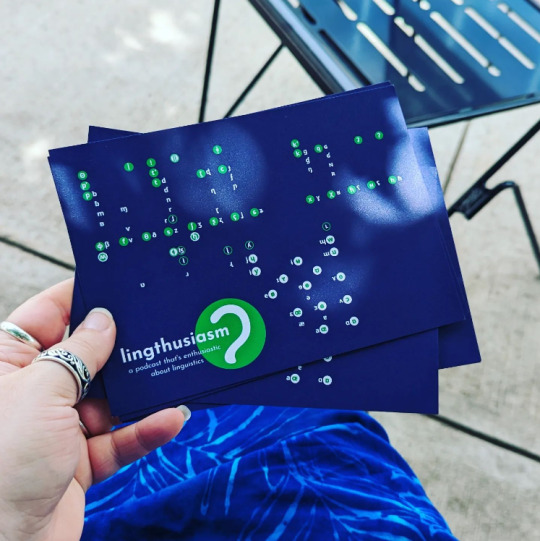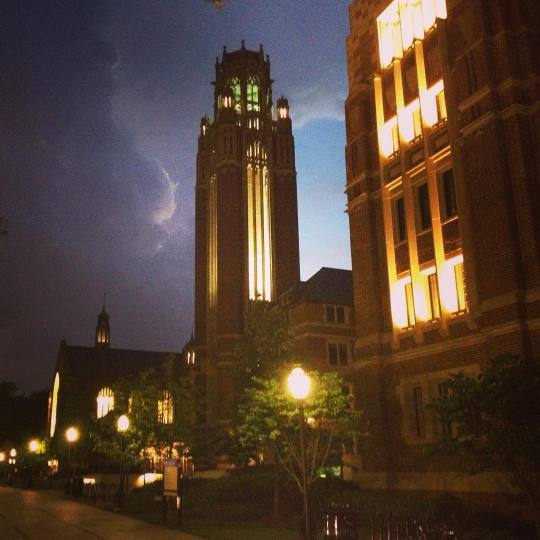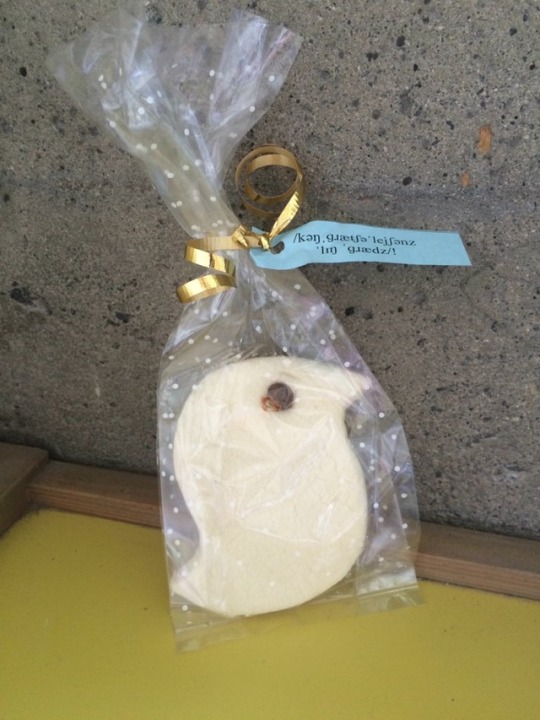#lingstitute
Text
Bonus 80: Postcards from linguistics summer camp
What if there was a summer camp for linguists? Like, imagine you could just go somewhere for a few weeks or a month and do linguistics classes and go to linguistics talks and eat your meals with linguists all day every day? Well, this event exists, sort of, and they're called linguistics institutes.
In this bonus episode, Gretchen and Lauren get enthusiastic about Gretchen's visit to the 2023 LSA institute at University of Massachusetts Amherst this summer. We talk about cool projects that Gretchen learned about at this year's Lingstitute, including the Linguistic Atlas Project, the Oxford Dictionary of African American English, and the Wôpanâak Language Reclamation Project (talks about all of these projects are now available online). We also talk about the history of LSA summer institutes (the first one was in 1928, almost a hundred years ago!), why they're not to be confused with the Summer Institute of Linguistics (SIL), which is a missionary project for Bible translation (awkward), and both Gretchen's history attending various institutes and Lauren's history not attending them (sorry about the FOMO though).
Listen to this episode about linguistics summer camp and get access to many more bonus episodes by supporting Lingthusiasm on Patreon.
#language#linguistics#lingthusiasm#lsa#lingstitute#lsa institute#Oxford Dictionary of African American English#Linguistic Atlas Project#Wôpanâak Language Reclamation Project#linguistic summer camp
55 notes
·
View notes
Text
June-July 2023: Lingstitute and Merriam-Webster
In June and July, I headed to Lingstitute 2023, the LSA summer institute, at UMass Amherst. It was great to get to hang out with old friends and meet lots of new people
While I was in Massachusetts, I dropped by the headquarters of Merriam Webster to say hi to the dictionaries and lexicographers! (In that order.) Thanks especially to Peter Sokolowski for the guided tour and to Stacy Dickerman…

View On WordPress
#auxiliaries#dictionaries#internet linguistics#lexicography#lingstitute#lingthusiasm#linguistics jobs#podcasts#questionnaire#tweets
21 notes
·
View notes
Text
okay I am done for the day. I can’t remember what else I need to work on and I’m too brained-out to be able to think of anything to write for the abstract for my advisor’s morphology workshop at the Lingstitute this summer, so HEY
TIME FOR FARM SHARE. TIME FOR HOME. TIME FOR DINNER THAT I DON’T MAKE MYSELF.
1 note
·
View note
Photo

Storm brewing #chicago #uchicago #lingstitute #architecture #neogothic
26 notes
·
View notes
Note
Hey! So I know this isn't an easy question to answer w/o knowing specifics, but what do you think about a high school student w/ an interesting ling going to the Linguistitute? Good idea? Bad idea? Better things to do w/ the future in mind? I know minors aren't allowed into CoLang, but I've heard they can go to the Linguistitute, so idk.
Unfortunately, I don’t know whether the LSA Institute allows minors to attend. It is definitely open to undergrads. Checking previous Institutes' websites, they don't explicitly state high school aged students may (or may not) attend. They do say undergrads, grads, and anyone engaged in the academic community.
However, I know that there are many summer schools for high school students at which you can take linguistics courses. (That's actually the type of place where I took my first linguistics course!)
Here are some programs that are designed specifically for pre-college students:
Summer Linguistics Institute for Youth Scholars at OSU
Columbia U's Summer Program for High School Students
Harvard Secondary School Program (I went to this one!)
Penn's Young Scholars Program
Summer College at Cornell
and a list of some others, which I haven't gone through
So do any of you have a definitive answer on what the LSA Institute's policy on pre-college (or minor) attendees is?
15 notes
·
View notes
Video
youtube
Monolingual Demonstration by Dan Everett
This is how linguistic fieldwork works. Demonstrated by the "Chuck Norris of Linguistics" - Daniel L. Everett.
38 notes
·
View notes
Conversation
Scalar implicatures
Me: So Masoud, how would you rate the quality of your Scalar Implicatures and the Grammar course?
Masoud: Well--
Me: And quantify your response in terms of apples.
Masoud: Ten. I would give it ten apples.
Me: And justify your response.
Masoud: Well, it should definitely get *some* apples...
Me: *facepalm*
1 note
·
View note
Text
Field Recorders
Attn linguists of tumblr: what would you recommend for a field sound recorder that isn't too expensive?
3 notes
·
View notes
Text
I'm like stupidly sad that I didn't go to the linguistics institute this year.
2 notes
·
View notes
Text
July 2019: Because Internet is published and makes the NYT Bestseller list!
July 2019 newletter: Because Internet is published and makes the NYT Bestseller list!
There was a New York Times Daily review of Because Internet (paper version!). Here’s one of the very nice things that reviewer Jennifer Szalai had to say about it:
McCulloch is such a disarming writer — lucid, friendly, unequivocally excited about her subject — that I began to marvel at the flexibility of the online language she describes, with its numerous shades of subtlety.
There was also SO…
View On WordPress
#because internet#book#cbc#collaborations#conferences#editathon#emoji#explainling#internet linguistics#interviews#lexicon valley#lingcomm#lingstitute#lingthusiasm#lingwiki#links#lsa#new york times#NPR#podcasts#reviews#speaking#tom scott#tumblr#tweets#twitter#videos#wired#writing
48 notes
·
View notes
Text
2017 Year in Review
Cross-posted from All Things Linguistic.
In 2017, podcasting turned from a fun new experiment into a real, self-sustaining project, I checked off half of the American states on my have-visited list thanks to conference rotation (lifetime, not just in this year), and I got my book way closer to being a real thing you’ll get to see soon.
Lingthusiasm podcast
My podcast with Lauren Gawne, which…
View On WordPress
#book#conferences#cross-post#interviews#lingcomm#lingstitute#lingthusiasm#linguistics jobs#lingwiki#podcasts#speaking#sxsw
20 notes
·
View notes
Text
July 2017: teaching #LingComm class, attending #lingstitute, and a crochet wug
My newsletter for July 2017: teaching #LingComm class, attending #lingstitute, and crochet wug
This month, I was quoted in this New York Times article about how we type laughter online.
The tenth Lingthusiasm episode went up, about learning languages linguistically, and the Patreon bonus was about hypercorrection.
I taught a four-week class on communicating linguistics or LingComm at the LSA institute in Lexington, Kentucky. The day-to-day class notes can be found on the @LingComm twitter…
View On WordPress
#conferences#editathon#explainling#internet linguistics#interviews#lingcomm#lingstitute#lingthusiasm#lingwiki#livetweets#lsa#podcasts#teaching#tweets#washington post#wugs#linguistics handcrafts
34 notes
·
View notes
Photo

This addition to the linguistics baked goods files was made by Martha McGinnis-Archibald at the University of Victoria.
News: I’m heading to the LSA Summer Institute, aka Lingstitute, which you can follow along with from afar on the #lingstitute hashtag or join the facebook group if you’re attending.
91 notes
·
View notes
Photo

Here’s my diy #lingstitute nametag, complete with @lingthusiasm badge, many social media references, and bonus wug! Looking forward to meeting people this month!
59 notes
·
View notes
Text
#LingComm day 3: The Curse of Knowledge and short talks
Previously: LingComm day 1: Goals and #LingComm day 2: Terminology and the explainer structure
We started by looking through the twitter threads that people created from last time, talking about what was easy and difficult. You can see these threads on the #lingcomm hashtag -- there were some nice interactions with people outside the class too!
We did an exercise on the curse of knowledge where one group tapped out a song and tried to get the other group to guess it. In the lab, researchers have found that about 40% of tappers think that their song is clear, while only 2.5% of guessers actually succeed in guessing it. Our percentages were slightly different than that because one group chose the song “We Will Rock You”, which of course has a distinctive clap pattern. (Very clever, dangit.)
We then talked through a few quotes from this article by Steven Pinker, which was the reading, about how already knowing things makes it hard to remember what it was like to know have known them.
We looked at a couple approaches to fixing it, from the mechanistic (like up-goer five, which makes you use only the 1000 most common English words) to the imaginative (like having an “ideal reader” in mind who doesn’t have a background in the topic).
Then we had a break for improv games! We started with a quick clap-passing game (synchro-clap) as a warmup, and then moved into telling a collaborative story one sentence at a time, three words at a time, and one word at a time. One of the key things about this game is not being a mind-reader: other people are going to take the story in different directions than you anticipated!
We then watched a couple video clips of short linguistics talks: the three-minute thesis and two-minute thesis by Sara Ciesielski
youtube
youtube
This video by Tom Scott, which explains 4 linguistic concepts in under 4 minutes.
youtube
These particular two examples are a good contrast of two distinct styles of lingcomm that are both effective: the thesis explainer has a relaxed pace and uses vivid stories without much terminology or visuals, while the features video has a quick pace, lots of visuals, many terms, and doesn’t really tell stories. But they’re both engaging to listen to, start where the listener is at, and don’t rely on the listener remembering the meaning of a whole bunch of new terms, even when they introduce them (low cognitive load).
There are also a couple supplementary videos which we didn’t get to but which I’d recommend, especially if you’re following along with this class from afar: this three-minute thesis talk about tones in Cantonese heritage speakers, this video about overcoming the curse of knowledge in three-minute thesis talks and other common difficulties, and this video explaining a neuroscience concept at 5 levels of difficulty.
The in-class exercise was to talk through how you’d explain a more difficult or challenging concept, such as your own research or a paper you’ve recently read.
Next class is going to be about debunking myths and changing minds. Reading is this handbook on debunking and homework is to explain a non-basic linguistics topic on twitter (such as your own research or a reading you have for another class), using images such as screenshots, photos, and/or gifs.
41 notes
·
View notes
Text
#LingComm, day 7 & 8: Pitching and final projects
Previously: LingComm day 1: Goals, #LingComm day 2: Terminology and the explainer structure, #LingComm day 3: The Curse of Knowledge and short talks, #LingComm day 4: Myth debunking and in-person events, and #LingComm day 5 & 6: Events, self-promotion, and charades.
Day 7 of LingComm was about pitching. Let's say you've gotten super energized for communicating linguistics from the previous days. Great!
But: who are you communicating with? How do you reach them?
Why are they going to stay? That’s why you need to pitch!
There are two main kinds of pitching:
1. Pitching to people with an audience to share their audience:
e.g news sites, schools, existing events, blogs, funding agencies
2. Pitching directly to a mass of people to attend/pay attention to your thing:
e.g. you're running a new event, starting a blog
For many people, the first pitch-like document they write is the college application essay. That's a problem. A college app is about you. A pitch is not about you. It's about how you're going to solve a problem/meet a need of the person/people you’re pitching.
So, what kinds of needs do blogs & news sites have? Content: publishing interesting stuff that is relevant to their mission.
What kinds of needs do schools have? Meeting curriculum goals and keeping interest of students.
What kinds of needs do event-organizers have? Attracting people to their events and executing their vision for event
In summary: There are hidden, group audiences that gatekeepers are trying to satisfy: readers, watchers, students, attendees, funders. But gatekeepers also have own goals/visions: otherwise all events would be free kittens, puppies, and candy
Pitching to gatekeepers isn’t just about explaining your thing -- it’s about explaining how your thing is relevant to their a) goals and b) audience.
Sometimes this is subtle! People use themselves as audience-proxies: if they find something intriguing, assume audience will too. (Is assuming your audience will like what you like always a good idea? No. Do people do it anyway? Yes.)
The other thing that a gatekeeper wants to know is, assuming you have a good idea, can you actually do it well? So, how do you prove you can do it well? You might do so by having a really well-done pitch, such as by looking at other people’s applications and having someone how knows the area look yours over. But more probably, you’ll need to have a track record.
So where do you get a track record? Sometimes you can make a case tht a slightly different thing you did counts as relevant experience. But sometimes you’ll need to just make the thing. That brings us to pitching type 2: attracting your own audience
Discussion questions: What kinds of needs do people have? What kinds of things put people off, even if you could have solved a legitimate need for them? Let's go to psychology for a sec: where does learning about linguistics fit into Maslow’s Hierarchy of Needs?
Linguistics can't compete with the need for food or sleep - so don't try and make it! (Have food at events! Schedule wisely!) But also think about higher needs: do some people feel unsafe at your event? Is the location the kind of place where people you’re trying to attract feel comfortable? Does it compete with childcare/family responsibilities? (Or is it a thing people can bring kids do?) Can people actually read your website?
Can learning about your thing help people feel closer to friends/family, more confident in themselves, or even ~self-actualize~? Some examples of this from different areas in linguistics
Sociolinguistics: now I understand why I slash my friend says this thing!
Acquistion: now I get why my baby says this thing!
But also and more subtly: people's identities are bound up in what news they share (eg fans of I Fucking Love Science share links to show off their identities as people who like science and can find interesting links.) The New York Times dialect map quiz was its most popular feature ever -- people were sharing it to show off their identities.
A few links: a thread on pitching freelance writing, a reflection post on knowledge mobilization. Notes: I especially liked using the hierarchy of needs to emphasize that accessibility isn’t a thing you tack on at the end, it’s a basic part of designing an event in the first place if you want people to come.
Important addendum to pitching #lingcomm: many people don't do it in the first place! Most important is TRYING and improving for next time.
We also played an improv game called Presents which develops spontaneity and thinking on your feet.
Day 8 was a class presentation day, where the students shared their works in progress for the final projects. I’m really excited about all of them and I’m looking forward to sharing many of them here when they’re in their final forms!
16 notes
·
View notes